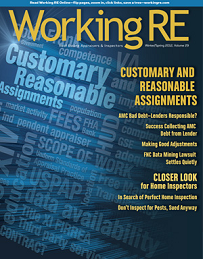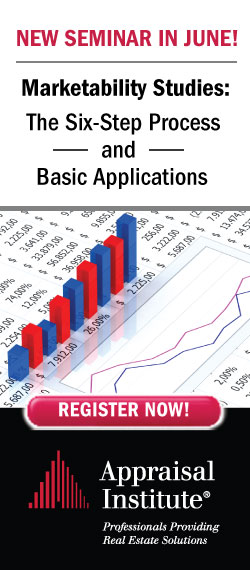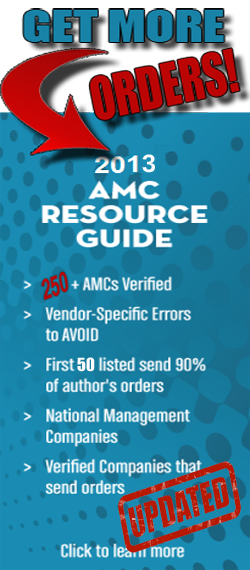
|
Published by OREP, E&O Insurance Experts | May 23, 2012 | Vol. 252 |

|
> Blogs
> Leave Comments Below |
Anderson says the key
to repeat business with other-than-lender work is producing quality reports
and not advocating for or bending to the desired results of the
clients.
Andy Anderson's next Webinar May 31:
Dealing with a Negative Review
Editor’s Note:
According to Andy Anderson, with other-than-lender appraising, the
pressure is for accurate, independent reports and not to be compliant.
Professional Appraiser Series: Pros and Cons of Non Lender Work
By David Brauner, Editor
Funny thing about doing
non-lender work: unlike what most appraisers are accustomed to when doing
lending-based work, with non-lender work, the pressure is for accurate,
independent reports. And these are the appraisers who are rewarded with repeat
orders- not those who are most compliant.
“Making the appraisal assignment the focus, and uncompromised, unbiased
conclusions the priority- before the wishes and desires of the client, typically
result in more respect and repeat orders from other-than-lender clients—not the
opposite,” said veteran appraiser and educator Andy Anderson in his webinar
Other than Lender Work.
Anderson, appraising 28 years in California, is author and presenter of the
Professional Appraiser Series of webinars, hosted by OREP/Working RE
Magazine. Anderson says the key to repeat business with other-than-lender work
is producing quality reports and not advocating for or bending to the
desired results of the clients. You have to earn the respect and confidence of
clients who in many cases do not know anything about the appraisal process.
You can expect to spend
more time in communication with other than lender clients than with AMC and
lender clients, says Anderson, who does appraisals for insurance, divorce,
litigation, estate, probate, personal use, tax and assessment, eminent domain
and personal property (mobile and manufactured homes). He says the work is
more challenging and satisfying because the appraiser is responsible for truly
identifying the problem, determining the scope of work necessary to produce
credible results, establishing charges and setting turn times.
But the work can also be emotionally draining, like interviewing a family member
who just lost their home to fire during an insurance property inspection. “You
tend to hear people’s personal stories when having to determine the size,
quality and condition of the destroyed improvements. It can be tough and very
emotional,” Anderson said.
He says dealing with the public also comes with a higher risk of complaints.
“Other-than-lender work has a greater potential to create headaches for the
appraiser and possible complaints to the state regulatory office (OREA in
Calif.), not to mention lawsuits; more so than with the typical lender
assignments. The reality is that those who rely and depend on the assignment
results will not necessarily understand the process of development, methodology
and conclusions outlined in the report. Underwriters and reviewers are more
familiar with the forms and reports they read, at least we hope so, and should
not need as detailed an explanation of the appraisal process,” Anderson said.
But non-lender work tends to broaden an appraiser’s abilities as well as sharpen their communication skills. “The ability to communicate effectively is very important. If the client does not understand what has transpired, you have not only lost the client but any referrals as well,” he said. “It helps if you have the ability to empathize with those you will have to interview in the course of collecting data. Sitting with a homeowner and going through personal photo albums to determine condition and quality of a destroyed structure is not for everyone.”
He says that breaking in to this work is not always easy because clients look for expertise and knowledge, which require experience and education. Anderson says the fastest route to non-lender work is greater education and finding a good mentor willing to train you. It takes time to learn and develop the expertise and knowledge in any of these niches. “Appraisers who want to expand their businesses need to take classes on subjects and topics they are not familiar with. I can’t tell you how many times an appraiser will tell me ‘I don’t do mobile homes’ when I invite them to take the Appraising Manufactured Homes class I instruct. Then they call me for advice when they get an order for one and don’t want to turn down the assignment or lose the extra income,” Anderson said.
The bottom line for Anderson is that this work puts the appraiser in control, not the AMC and not the lender. “The underwriter or reviewer needs to be able to prove my appraisal is less than reliable or not accurate and support their reasoning to me- not the other way around. I inspect the property, research the market and complete the report. Having to provide additional data to satisfy an uncontrollable desire for more information, not better information, is not productive. With lender work these days, the demands of many AMCs and lenders seem to have little to do with truly supporting the actual value conclusions. With non-lender work, you are in control of the process and results, and in many cases you can end up as an expert witness in defense and support of the value conclusion. Separate charges apply! See you in class!”
Webinars:
-Part 1: In Andy Anderson's
most recent webinar,
Professional Appraiser Series: Other than Lender Work, he explains
the ins and outs of other than lender work and share his experience as an
appraiser doing specialty work for lawyers, accountants, insurance companies,
and more.
-Part 2: On May 31st, Andy will present Part 2 of the Professional Appraiser Series: Dealing with a Negative Review. In this next webinar, Andy will offer advice about how to avoid a negative review, as well as help appraisers understand how to craft a detailed, professional response to a negative review and take the necessary steps to protect their livelihood and career.
About the Author
David Brauner is Editor of Working RE magazine and Senior Broker at
OREP.org, a leading
provider of E&O Insurance for appraisers, inspectors and other real estate
professionals in 49 states. He has covered the appraisal profession for over
20 years. He can be contacted at
dbrauner@orep.org
or (888) 347-5273. Calif. Insurance Lic. #0C89873.
HTML Comment Box is loading comments...
ATTENTION: You are receiving WRE Online News because you opted in at WorkingRE.com or purchased E&O insurance from OREP. WRE Online News Edition provides news-oriented content twice a month. The content for WRE Special Offer Editions is provided by paid sponsors. If you no longer wish to receive these emails from Working RE, please use the link found at the bottom of this newsletter to be removed from our mailing list.



